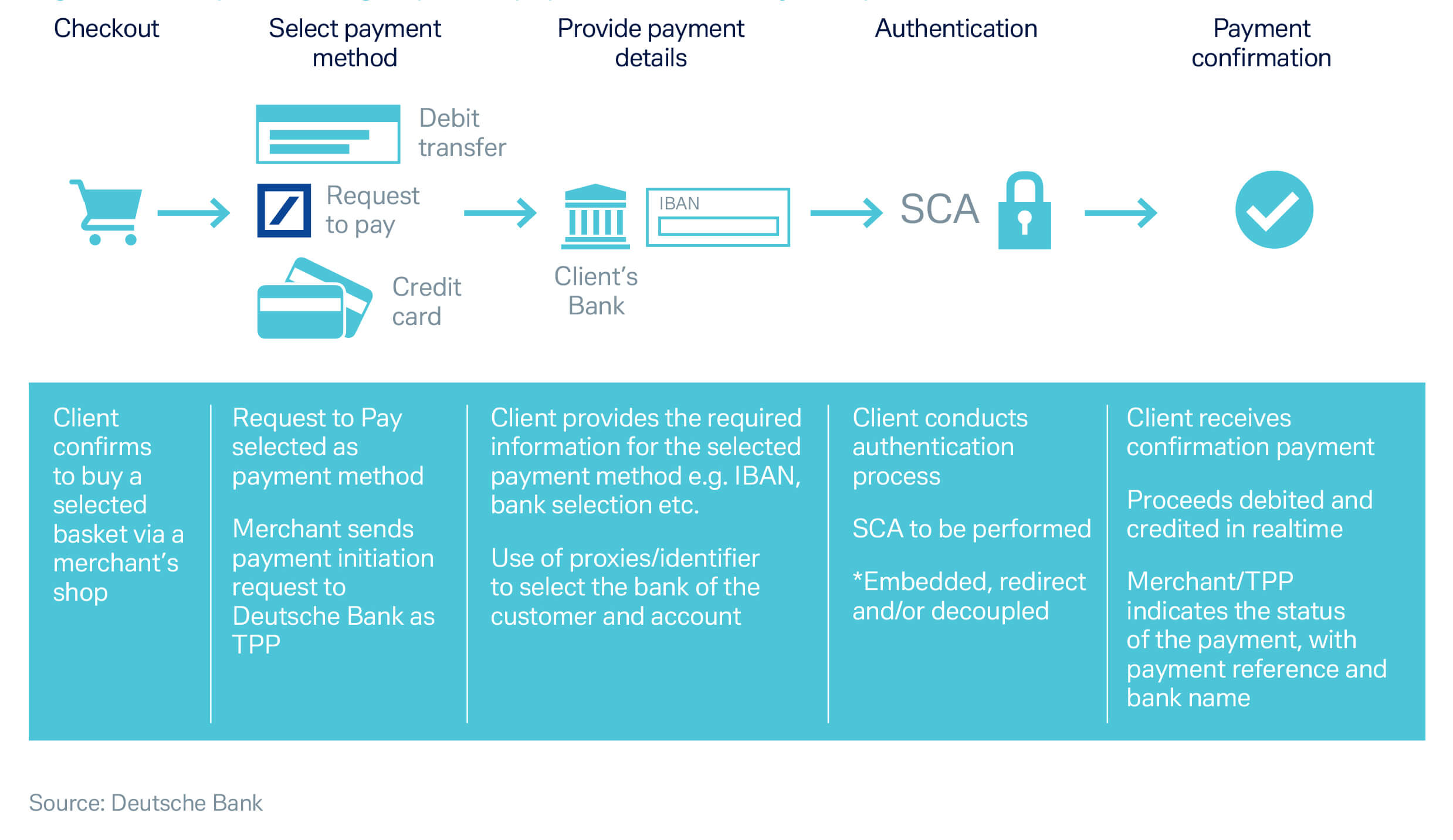March 2020
The implementation of Europe’s second Payment Services Directive (PSD2) has unlocked a number of new open banking solutions, such as Request to Pay (RtP)
This new solution combines SEPA payments (both classic and instant) with PSD2’s provision for licensed third parties to access and service accounts held by other banks to allow payment service providers (PSPs) and merchants to receive payments on behalf of their customers in a lean and efficient manner.
With markets now adjusting to the changes, these solutions are quickly being put into practice. MultiSafepay, an online payments specialist and one of the pioneers of e-commerce in the Netherlands, is one of the first to take the initiative, participating in a pilot scheme for Deutsche Bank’s innovative open-banking RtP solution, which is now being rolled out to a series of merchants in Germany, with plans to enable it across Europe and beyond.
"This is an exciting development for us – and one that shows our willingness to adapt to new regulations and seize the opportunities they create. The advent of Request to Pay represents a milestone in advances driven by PSD2 and an exemplar of the creative interplay between regulation and innovation."
Open banking approach to Request to Pay
Under PSD2, consumers can authorise their bank to give third-party providers (TPPs) access to their account data, most commonly via application programming interfaces (APIs). Building upon this idea, Deutsche Bank employs a three-corner model for its RtP solution: facilitating a three-way interaction between the customer’s bank, the customer and the merchant.

Open banking model for Request to Pay
Other similar approaches are also underway – most notably, EBA CLEARING’s R2P Scheme, for which Deutsche Bank is one of the partners. Set to be established later in 2020, this scheme provides a similar end-user experience but operates a four-corner model without the use of open banking and APIs.
Merchant benefits
For the time being, Deutsche Bank’s solution can generate significant benefits for MultiSafepay’s corporate clients. “Our merchants like Request to Pay for a few reasons,” says Olaf Geurs, Owner of MultiSafepay. “For one, they are cheaper than card transactions, incurring just a small, flat fee per transaction. What’s more, they are processed instantly and irrevocably – much faster than the standard T+2 settlement period for cards, thereby reducing the associated risk of non-payment.”
Consumer benefits
Consumers buying from online merchants using MultiSafepay’s services stand to benefit from a greater range of payment choices and an easier, less complex payments process.
When checking out at a MultiSafepay client’s online store, the consumer chooses from a list of payment options, such as credit card, debit card or an e-wallet provider – and now also RtP. After clicking RtP the consumer selects its bank from a drop-down menu and enters their known online banking login credentials, such as a user ID or account number. If this is a repeat visit to a trusted merchant, and provided the consumer has given their consent, their details may already be stored by MultiSafepay – meaning they will have a more streamlined customer journey.

A secure solution
This process is also in line with the highest standards of security, requiring two-factor authentication (2FA) to access the account and authorise the payment. This means the consumer must provide two of three possible forms of credential, i.e. possession of a device, an account number or bank account credential, and a password or code (e.g. a QR code) – steps that can be carried out quickly (with a mobile device and a thumbprint, for example), yet which dramatically reduce the risk of fraud. Since the solution works based on a consumer’s existing bank accounts, its foundations are also rooted in a long-established, trusted relationship.
Once a payment is made using the RtP solution on MultiSafepay’s platform, Deutsche Bank acts as the TPP – or more specifically, the payment initiation service provider (PISP) – to access the customer’s bank account and initiate (if sufficient funds are available) a transfer of the agreed purchase price directly to the respective merchant. As detailed above, 2FA security is mandatory – meaning that strong customer authentication is provided before the payment is sent.
The payment is usually sent via a “classic” SEPA Credit Transfer or Instant Credit Transfer (SCT Inst). As Christof Hofmann, Global Head of Payments and Collection Products, Cash Management, Deutsche Bank explains “using instant payments as the payment method allows the solution to provide its full added value to the merchants. Payment risk is eliminated and fulfilment can be initiated immediately, based on the real-time payment receipt notification sent via an API.”
Fast implementation
Having agreed on the functional framework and plans, the technical implementation for MultiSafepay took just one month. “Together with Deutsche Bank, we carried out script and API testing to ensure the flow of messages ran smoothly between all parties and could be completed quickly – with everything from initiation, through 2FA authorisation, to confirmation, carried out within 10 seconds,” Olaf explains. “Once the testing was complete, we made the solution available immediately to participating merchants in Germany, with no set-up costs or sign-up.”
European potential
As a PSP itself, MultiSafepay is well versed in the potential of bank transfer solutions in different markets. In 2017, 60% of e-commerce sales in the Netherlands were completed through iDEAL – the country’s predominant bank transfer solution – while just 16% of payments were completed with a credit or debit card. Deutsche Bank’s RtP solution promises to be rolled out in a similar model right across Europe - and markets, where debit cards cannot be used, or are rarely used, for online payments, will be ripe for disruption.
Germany is one such market, where Girocard, the nation’s domestic debit card, is not yet e-commerce enabled. Imagine a customer is looking to buy their groceries from an online supermarket in Germany. With Girocard not enabled, the German shopper might choose a third-party bank transfer provider, such as Giropay or SOFORT payment. The user enters their bank details, a second-step authentication code and the money is then taken directly from the user’s bank account. On the face of it, this process may seem no different from RtP. Behind the scenes, however, the payment takes 2-3 days to process, which can create cash-flow issues for the merchant. As Olaf explains “since bank transfers are the de facto method for online payments in Germany, there is a gap in the market for a solution like Request to Pay, which operates in a similar way, but with heaps of added benefits.”
There is also scope for the solution to gain traction in markets where debit cards are regularly used for online transactions, with online sellers likely to favour this payment method over card payments that have longer settlement periods and incur higher fees. Adoption among consumers, however, may rely on these businesses providing incentives to make the switch.
Potential demand
Deutsche Bank report that so far, interest in the solution has come from a wide range of clients.
“A pan-European payment solution leveraging PSD2, the open banking framework and the instant payment capabilities resonates very strongly with Group Treasurers, as well as the teams involved in online platform developments,” explains Benjamin Madjar EMEA Head – Cash Management Structuring, Deutsche Bank.
“As such, over the last 18 months, we have identified significant interest from a number of major corporates across various sectors, including PSPs, marketplaces, retail, travel and insurance. We also note that the solution is not only of interest to our business-to-consumer clients, but also to business-to-business clients as well.”
Across Europe, the payments landscape is well-positioned to adopt this kind of solution. RtP represents a similar, but value-added, service compared to other bank transfer solutions – one that the market will be sure to embrace as a new European standard for online payments. It is this broad appeal that ultimately marks RtP out from the crowd, as Olaf notes: “The beauty of Request to Pay is that with one solution, you can provide online instant payments for the whole of Europe in a way that is consumer-friendly and secure.”
Go to Corporate Bank EXPLORE MORE
Find out more about products and services
Go to Corporate Bank Go to Corporate BankStay up-to-date with
Sign-up flow newsbites
Choose your preferred banking topics and we will send you updated emails based on your selection
Sign-up Sign-upSubscribe Subscribe to our magazine
flow magazine is published annually and can be read online and delivered to your door in print
You might be interested in
CASH MANAGEMENT, REGULATION
Open banking – heralding the dawn of open finance? Open banking – heralding the dawn of open finance?
As open banking gains traction, regulators are turning their attention to the next stage of development. Regulatory expert Polina Evstifeeva reviews initiatives
CASH MANAGEMENT, TECHNOLOGY
Sign of the times Sign of the times
Digital signatures quickly proved popular with major corporates, but the Covid-19 epidemic is now accelerating take up by companies while the service is expanding to more countries
CASH MANAGEMENT {icon-book}
Heart of the enterprise Heart of the enterprise
Business software provider SAP leads a consistent programme of innovation, the latest being its digital boardroom. Head of Global Treasury Steffen Diel demonstrates why leaving one’s comfort zone and being permanently curious can work miracles



